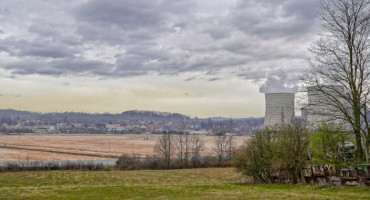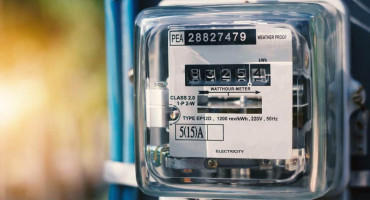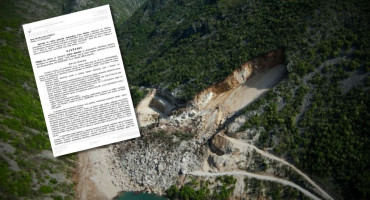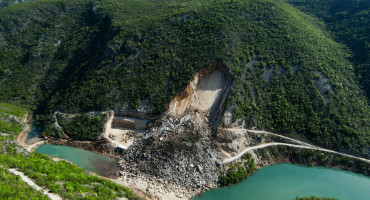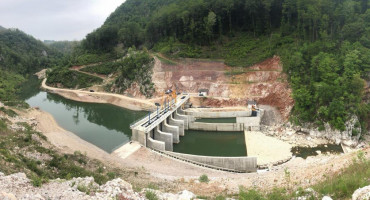Lack of Answers from Elektroprivreda BIH Regarding Block 6 Revitalization at Tuzla Thermal Power Plant
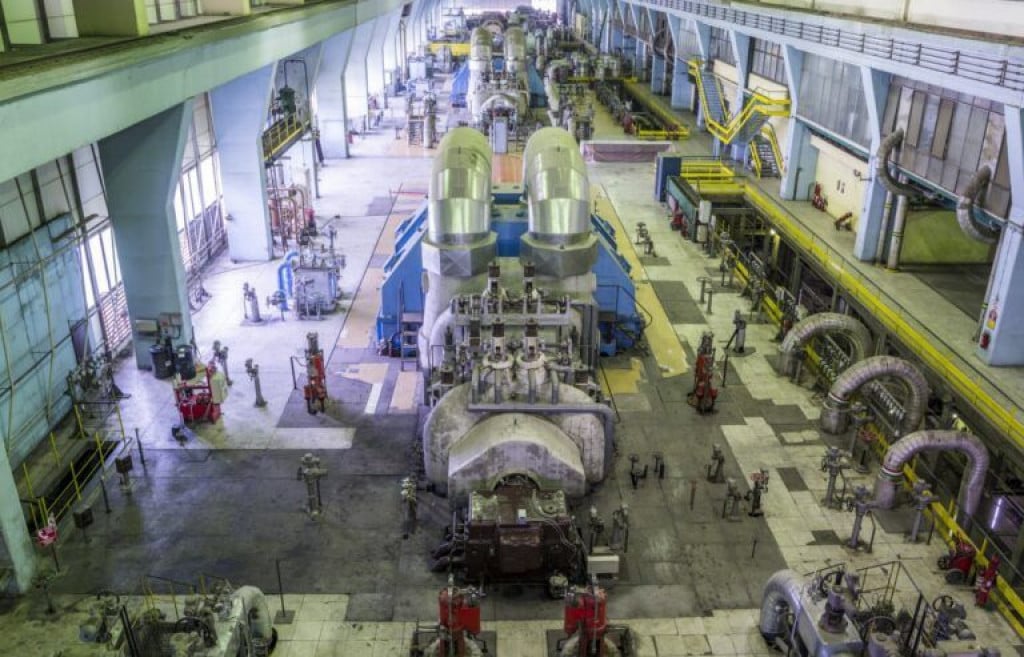
Elektroprivreda BIH consistently refuses to provide answers regarding the reasons for the delay in the project to revitalize Block 6 of the Tuzla Thermal Power Plant, which is entrusted to a Bosnian-Chinese consortium and has a total value of 29.7 million KM. At this moment, questions arise about how this project’s delay will impact the overall operations of this state-owned company, which already reports a loss of nearly 25 million KM according to its semi-annual reports.
Reminder: In January of this year, the portal Tačno.net reported that the “block 6 boiler revitalization” project was awarded to the construction company ITC Zenica and the Chinese state-owned companies Donfang Electric and Dongfang Boiler.
The significant lag in energy transition processes and the now undoubtedly halted project for the construction of block 7 at the Tuzla Thermal Power Plant are factors that have positioned the smooth operation of block 6 as a key point in the operations of EP BIH.
In the long-term plans of EP BIH and the business environment shaped by decades of strategic decision-making failures, block 6 of the Tuzla Thermal Power Plant is expected to be operational by 2040 or 2050.
However, the actions of the leadership of one of the most valuable companies primarily owned by the Federation of Bosnia and Herzegovina (FBIH), which have marked the entire crucial process of revitalizing block 6, raise questions about the professional capabilities of the personnel managing this enterprise.
Block 6 of the Tuzla Thermal Power Plant was built in 1978, and the last reconstruction was carried out in 2013 during the mandate of the then-SDP director Elvedin Grabovica. At that time, a total of 125 million KM was allocated for the revitalization, which included work on the boiler plant, turbines, cooling tower, power plant, electrostatic precipitators, automation, and ash transport. The EP BIH management at the time emphasized that this revitalization extended the operational life of this block by 15 years.
Just five years later, during the tenure of SDA cadre Bajazit Jašarević, an Elaborate on a new Boiler Block 6 Revitalization Project was prepared, and in 2019 a Decision on investment was made. According to official documents of EP BIH, the estimated budget for this investment was exceeded by 4.3 million KM.
“In the mentioned document, the importance of realizing this project is once again emphasized, and based on the analysis of the economic justification of investment in the block revitalization project, its justification is confirmed. The Internal Control Department, as well as the Commercial Affairs Sector, have considered the price movements of materials used in the market, and the justification for increasing the planned funds.”
In their reports, these sectors have determined that due to the prices of materials and services, the earlier budget was insufficient for the implementation of this project.
Reminder, in December 2019, EP BIH issued a tender, and in June 2020, the company made a decision on the results of the prequalification of candidates. Dissatisfied with this decision, the Consortium “ITC Zenica-Mitsubishi Hitachi Power System Europa GMBH and Elcom Tuzla” filed an appeal, which EP BIH accepted.
Polish Consortium “Zaklady Remontowe Energetyki Katowice SA Energotechnika-Energorozruch S.A. Gliwice” also appealed against this decision of EP BIH. Thus, the entire procedure was transferred to the Office for Review of Appeals and competent courts.
Following that, EP BIH, led by Admir Andelija, issued a new tender that was won by the Bosnian-Chinese consortium. In August 2022, ITC Zenica and Chinese state-owned companies Donfang Electric International Corporation and Dongfang Boiler Group Co. d.o.o. signed a contract for this project.
We have unlimited time at our disposal
The inertia of EP BIH’s management towards the implementation of a project crucial to the operations of this state-owned company is certainly evident in the oversights related to the alignment of an advance bank guarantee valued at approximately 9 million KM.
According to official documentation from the Internal Audit Department of EP BIH, the contract envisaged an advance payment of 30% of the contracted value, as well as a bank guarantee for an equivalent amount. However, EP BIH did not define the form or the deadline for the submission of the guarantee in the contract.
This oversight allowed the representative of the ITC Zenica consortium the opportunity to submit multiple drafts of the advance guarantee, three of which did not even include the address or headquarters of the bank.
Furthermore, in light of the possibility that the Chinese bank CHINA CITIC Bank might be excluded from the international SWIFT banking network due to geopolitical circumstances, EP BIH sought a model aimed at reducing the risk of being unable to collect the advance guarantee.
Thus, EP BIH proposed that in addition to submitting the guarantee via SWIFT, an alternative method in the form of a copy of the original paper guarantee should be provided. In this case, CHINA CITIC Bank requires the submission of the original guarantee, which, according to the opinion of Internal Audit, is highly debatable considering the risk that the original request for payment may be lost, given that the bank is located in Chengdu, China.
However, considering the significance of the revitalization project of Block 6 and the fact that over 100 days out of the 390-day deadline for aligning the appearance of the bank guarantee were spent in November 2022, the EP BIH Management accepted the proposal to accept the advance guarantee via SWIFT, as well as a potential protest through SWIFT.
“Recognizing the significance of the project for procuring the service of the revitalization of Block 6 boiler in TE Tuzla, as well as the potential consequences that could arise in case of delays in its implementation, both for EEB and subsequently for the financial reports of EP BIH, we believe that at this moment, in order to create the conditions for the advance payment to the Contractor and the start of the Contract implementation, the Management can accept the advance guarantee via SWIFT, as well as a potential protest via SWIFT.” Quoted from the Statement of the Internal Audit Department, November 2022.
In previous responses to inquiries from Tačno.net portal, EP BIH emphasized that the issue of bank guarantees has been resolved and that the contractor did not request an extension of deadlines due to delays related to the advance payment.
As announced by EP BIH, the start of the implementation of the Block 6 boiler revitalization project in TE Tuzla was supposed to begin in March 2023. However, according to information from the Tačno.net portal, the implementation of this project only began on June 15, with a delay of almost three and a half months.
Silence is golden
Suvad Isaković, the director of the company ITC Zenica, which leads this Bosnian-Chinese consortium, emphasizes that the works on the realization of the project for the revitalization of the boiler of block 6 are progressing according to the approved dynamic plan by EP BIH.
It should be noted that this Zenica-based company, specialized in the sale and distribution of agricultural equipment, has no relevant experience in the field of remediation or reconstruction of power plants.
ITC Zenica began its collaboration with Elektroprivreda BIH in 2019 through preparatory construction works for the construction of the never realized block 7 of TE Tuzla. ITC Zenica, at that time in a consortium with the company “Integral” of the late Slobodan Stanković and Prijedorputevi, won a tender worth over 21 million KM, despite their offer being ranked sixth and five million KM more expensive than the most favourable bid.
The Tačno.net portal contacted EP BIH with inquiries regarding the delay in the project for the revitalization of block 6, as well as questions about why tenders for boiler reconstruction and the construction of desulfurization facilities are separated. However, Elektroprivreda BIH has not responded to our official inquiries despite our continuous insistence for nearly two months.
Furthermore, our calls for comments were not answered by Admir Andelija, the former general director, Samir Selimović, the executive director for production, and Izet Džananović, the longtime director of the Tuzla Thermal Power Plant.
The question arises as to how the delay in the implementation of this project will affect the overall business of EP BIH, which is already operating with a loss of approximately 25 million according to the semi-annual report. Another aspect is the fact that due to the overhaul, EP BIH will lose revenue from the sale of electricity that would have been generated by the operational work of block 6. In this context, it is entirely illogical for projects involving boiler revitalization and desulfurization plant construction to be carried out in different time intervals.
Due to the delays in the processes related to the overhaul of block 6, estimates suggest that EP BIH’s revenues will be reduced by tens of millions of KM, not counting the fact that the initial budget for the boiler revitalization project has increased by 4.3 million KM according to official data.
The future is in the hands of the Chinese
The second part of the consortium engaged in this project consists of Chinese companies Donfang Electric International Corporation and Dongfang Boiler Group Co. Ltd.
It is worth noting that the business of Donfang Electric International Corporation (DEC) in Bosnia and Herzegovina is closely linked to the operations of EFT, owned by Serbian electricity trader Vuk Hamović.
Initially, this Chinese company was involved in the construction of the only private thermal power plant in Bosnia and Herzegovina – Stanari. This private project was marked by a series of scandals, including changes in concession fees, causing the RS budget to lose over 100 million just from this aspect. DEC and EFT in Bosnia and Herzegovina also collaborate on the construction of the Ulog hydroelectric power plant, along with the Chinese company Sinhydro Corp.
The successful completion of the Stanari Thermal Power Plant construction, coupled with intensive contacts between the political leadership of Republika Srpska, primarily Milorad Dodik, and the leadership of DEC, has positioned this company as a strategic partner for the future energy projects of this Bosnian entity.
Shortly after Milorad Dodik’s official visit to Beijing, in 2017, DEC will sign a “Memorandum of Understanding” for the implementation of the Upper Drina Hydropower System, which includes the Buk Bijela hydroelectric power plant project, whose implementation had been halted for political reasons.
With the change of government in the Federation of Bosnia and Herzegovina and the formation of new coalitions, negotiations intensify, reinvigorating discussions about the continuation of this joint project between Elektroprivreda Republike Srpske and Elektroprivreda Srbije on the Drina River, under the joint company “HES Gornja Drina”.
According to the portal Capital.ba, after direct negotiations with potential contractors, the lowest bid for the construction of this hydroelectric power plant, amounting to 248 million euros, was submitted by the Chinese company DEC. This company is also expected to secure financing, while the repayment guarantee for the loan will be issued by the Governments of Republika Srpska and the Republic of Serbia.
In addition to Bosnia and Herzegovina, where the company DEC has been officially engaged by EFT and Elektroprivreda BIH, this Chinese company also operates in the Balkans on the project of the ecological reconstruction of the Pljevlja Thermal Power Plant in a consortium with companies Bemax, Permonte, and BB Solar, owned by Blažo Đukanović, the son of Milo Đukanović, the former President of Montenegro.
In addition to the project for the revitalization of Block 6, Elektroprivreda BIH, together with the Chinese contractor Gezhouba Group, is still attempting to realize the construction of Block 7 of the Tuzla Thermal Power Plant, which, according to official data, has consumed approximately 304 million KM so far.
The complex situation, created precisely by the non-realization of Block 7’s construction, as well as the indirect consequences that this project had on the strategic development of Elektroprivreda BIH, along with other challenges faced by this state-owned company, such as mine closures and the future of operating within an environment of taxing dirty energy with CO2 levies, will be addressed by the new management.
We would like to remind you that Sanel Buljubašić, an SDP candidate, has been appointed as the acting director of Elektroprivreda BIH. According to available information, Buljubašić has no relevant experience in the energy sector.
